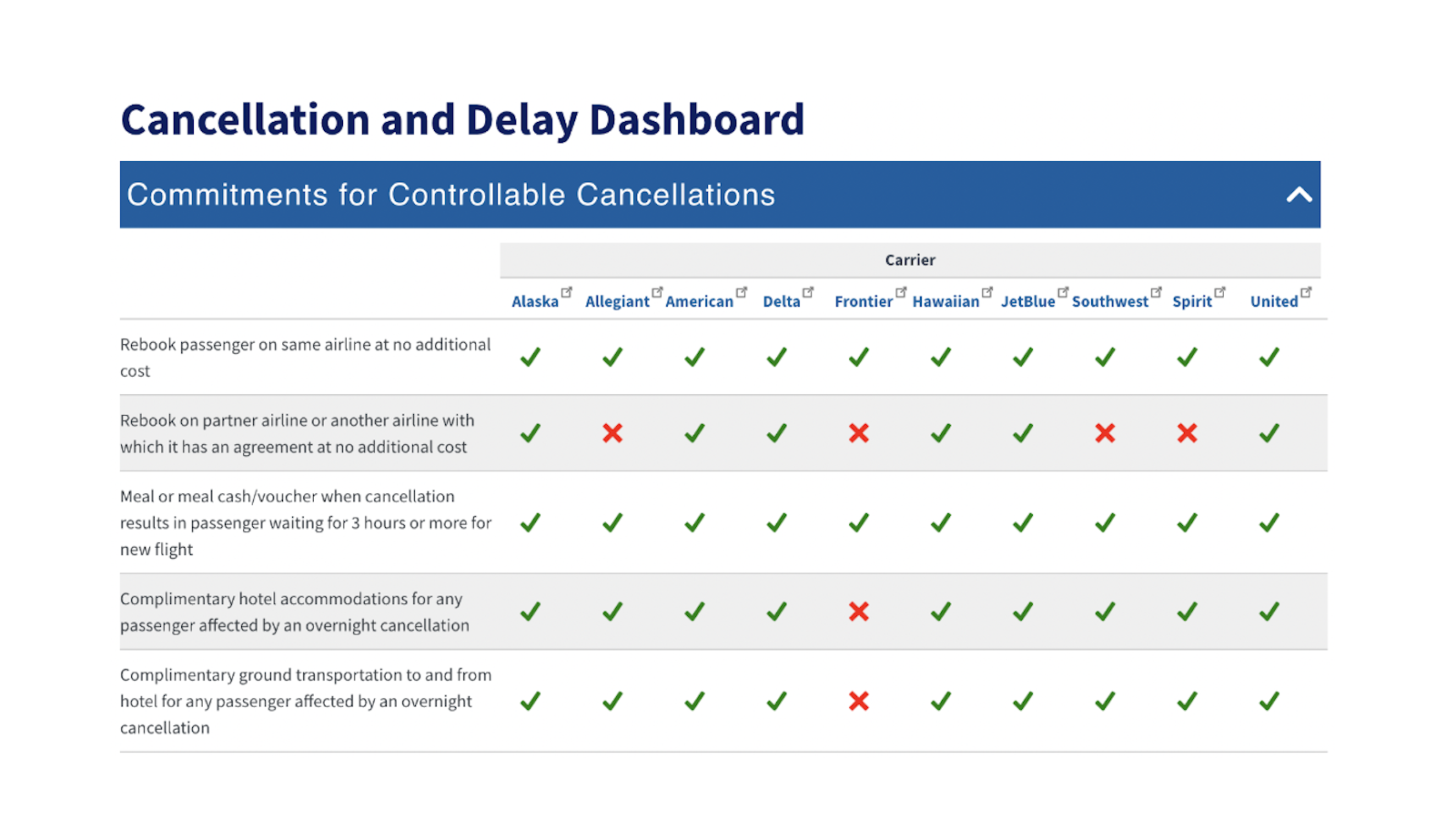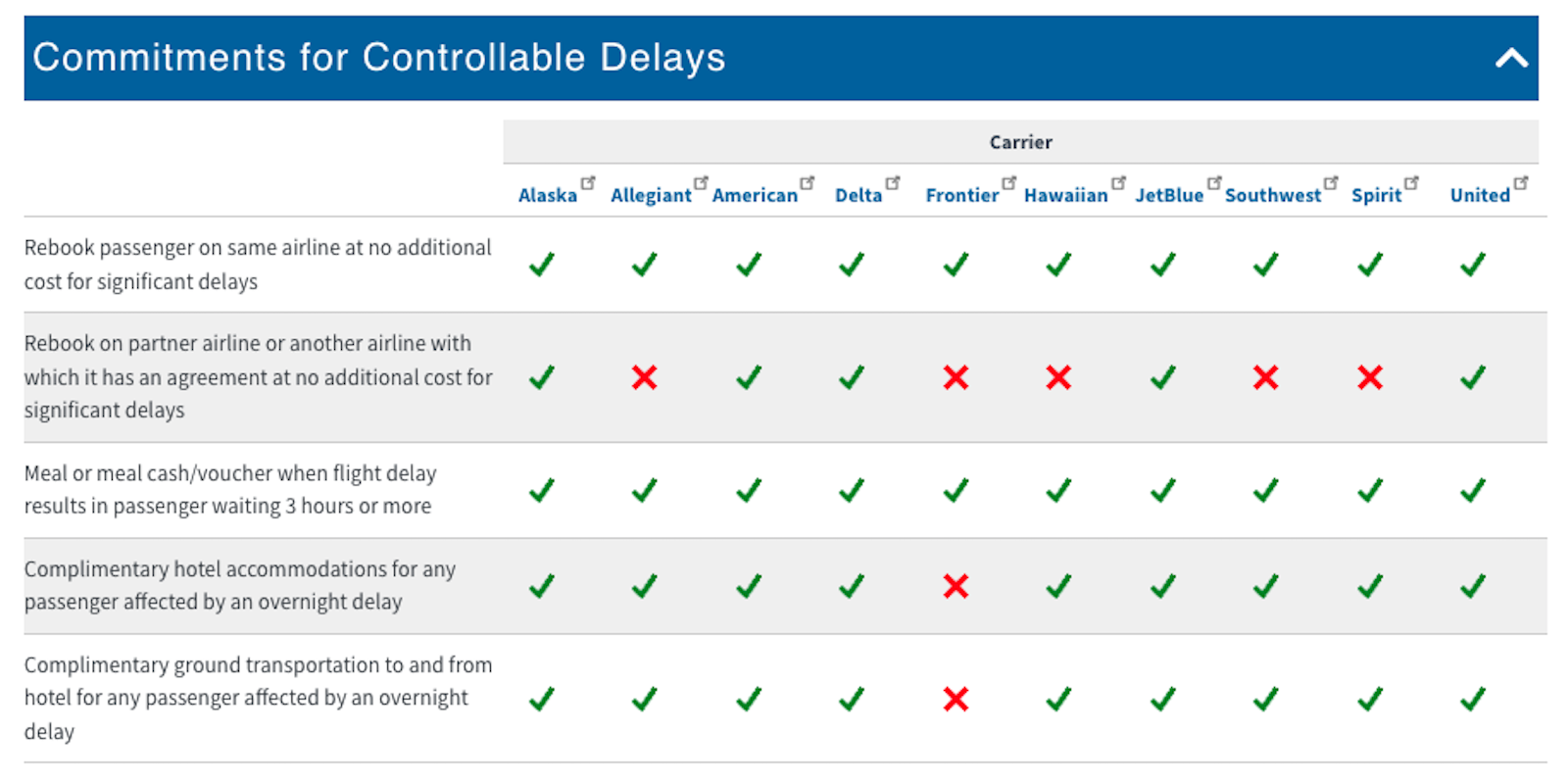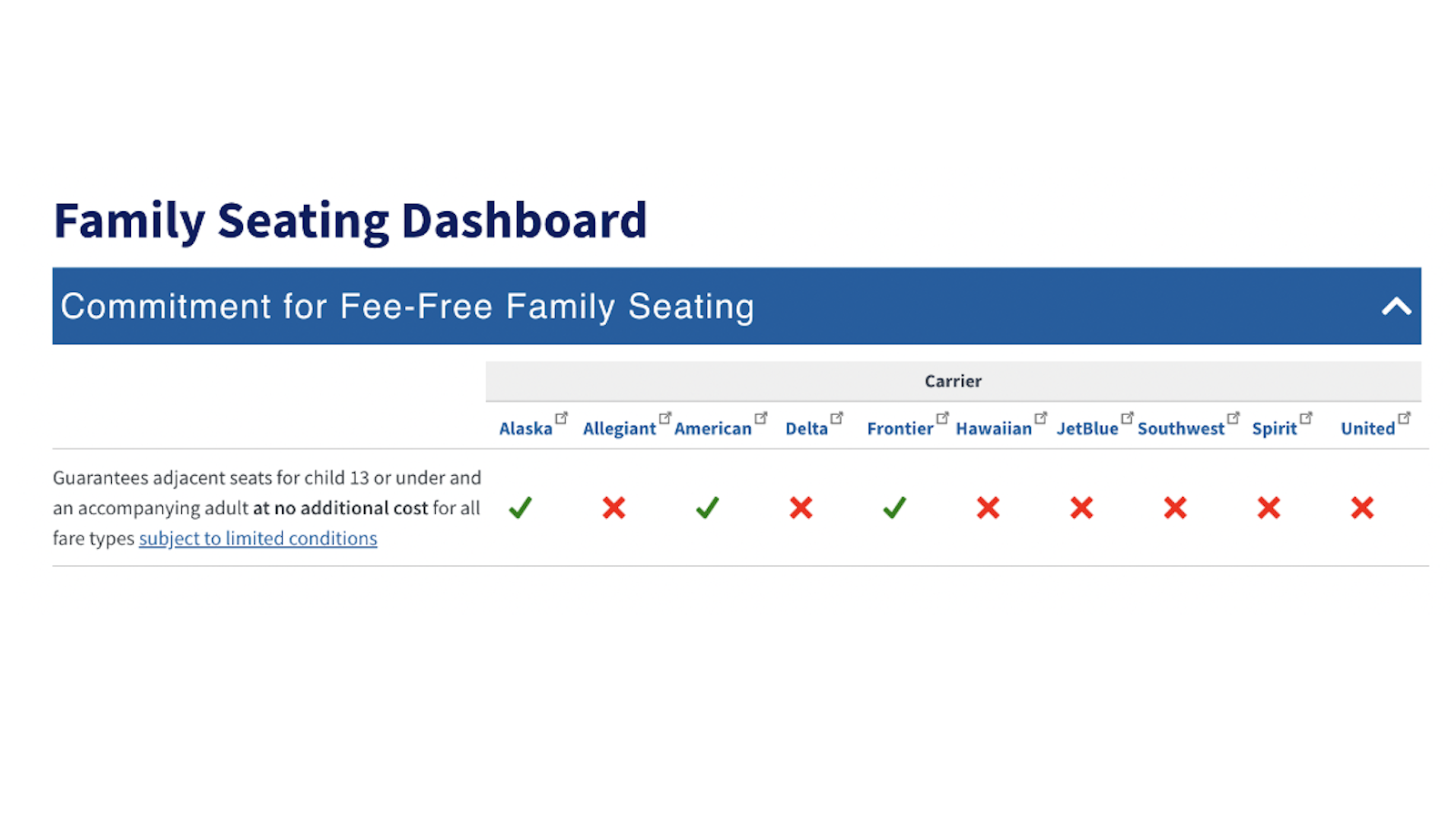
The Plane Truth
Passengers fed up with airlines' performance; analysis of DOT data shows complaints quadruple, cancellations soar
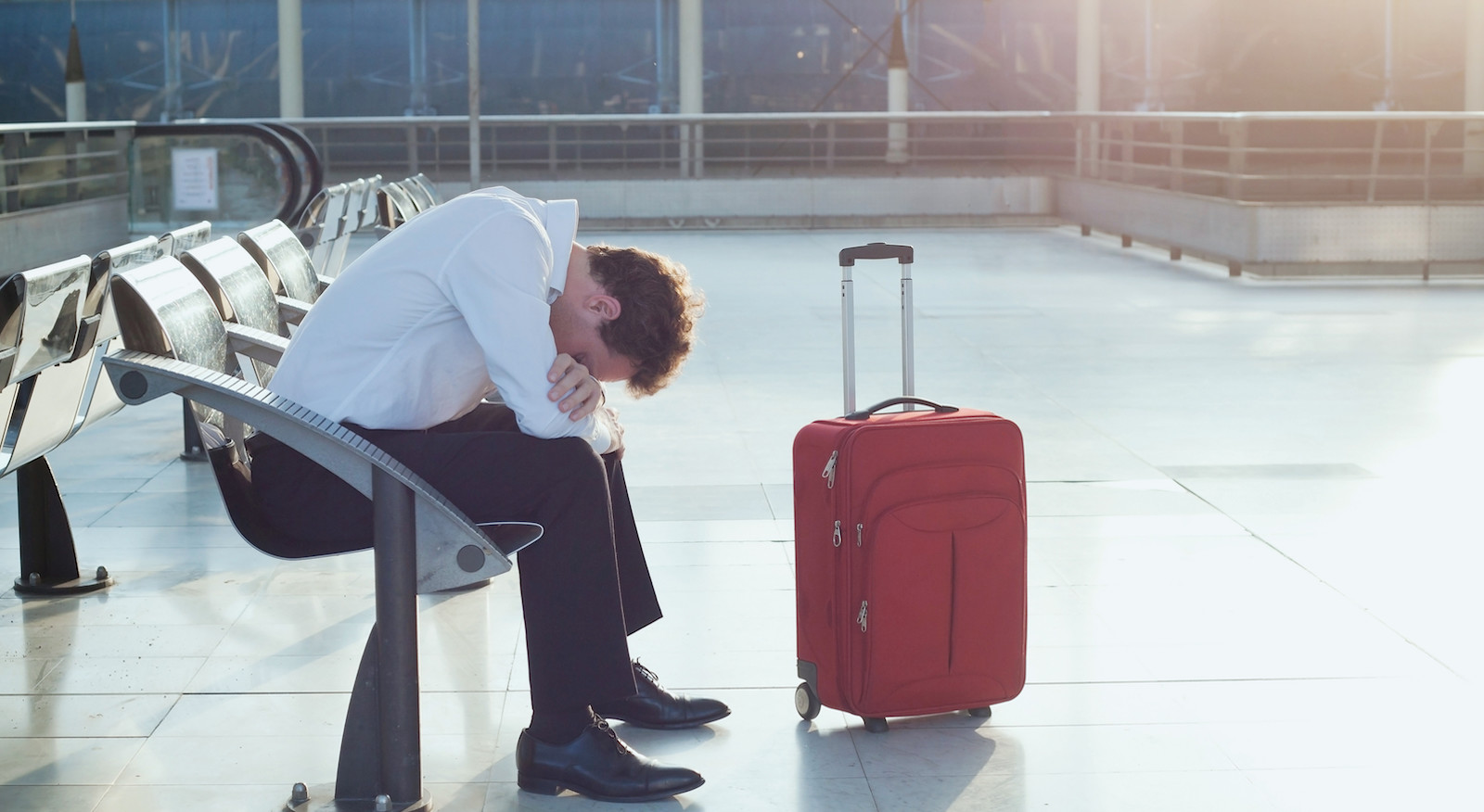
READ THE FULL REPORT
The number of people who flew in 2022 on U.S. airlines remains below pre-pandemic 2019 levels. But consumer complaints about air travel nearly quadrupled compared with 2019. And that’s before the final tally of the flood of December complaints.
Refunds – or the lack of – again topped the list of airline complaints for the first 11 months of 2022, but the volume of refund complaints fell significantly compared with 2021. Refund complaints, however, were still more than 10 times higher than in 2019 – again before counting December 2022 refund complaints.
Meanwhile, in a year when we started trying to get back to pre-pandemic “normal,” the airline industry wasn’t ready. Nearly every major holiday and travel period last year was marred by cancellations. Now, the industry is gearing up for the busiest travel season in four years, with 78 million passengers projected in April.
Over all of 2022, airlines 190,038 flights canceled in the United States, or 2.7% of all scheduled flights. And 1.44 million more flights — 20.6% – were delayed. This is according to just-released data from the U.S Department of Transportation.
Setting aside 2020, last year we saw the highest number of cancellations since 2001. Air travel was disrupted that year by the Sept. 11 terrorist attacks, when the skies were empty for days and quieter than normal for months after.
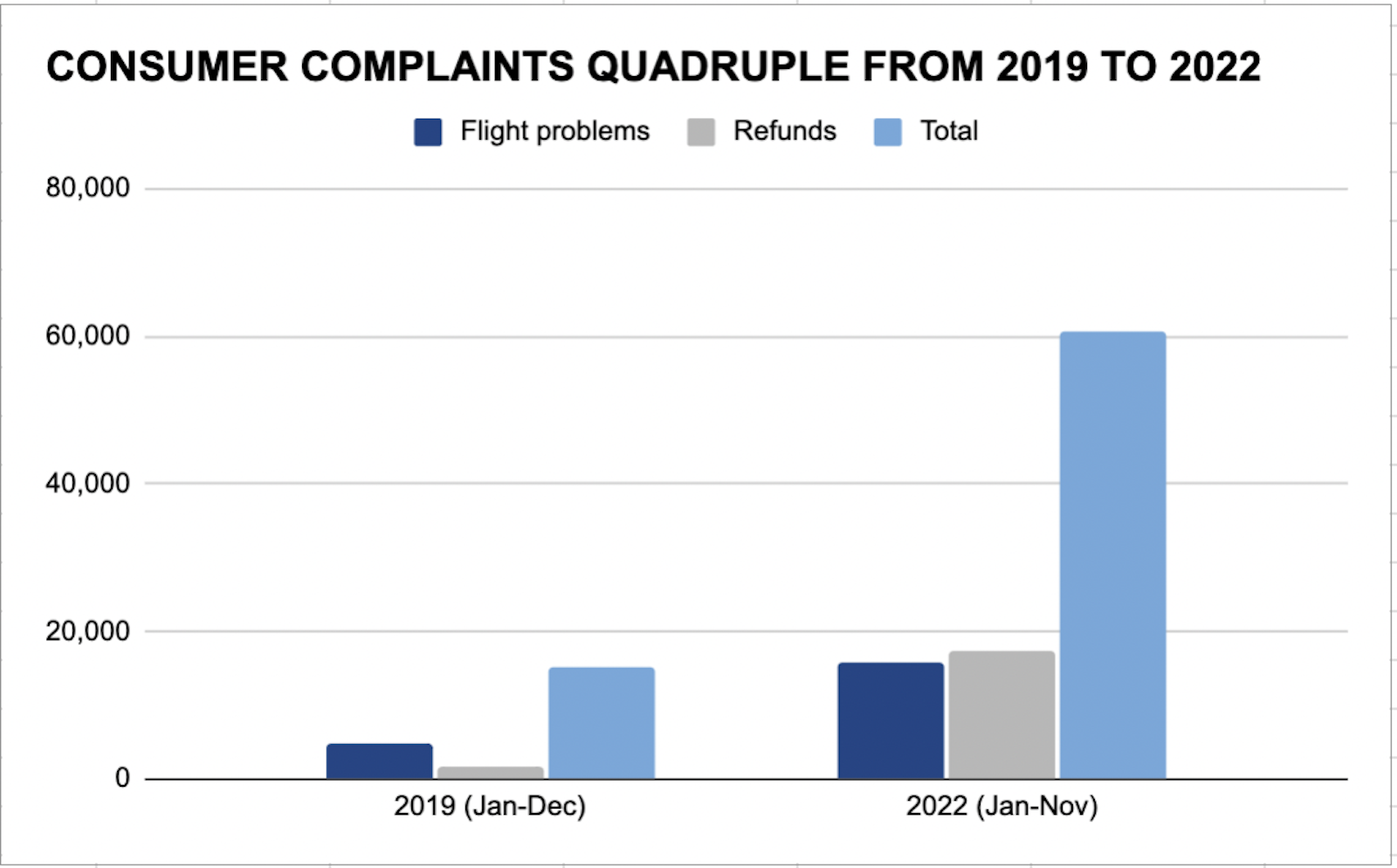
2022 was the first sort-of normal travel year since 2019. The volume of airline passengers in 2022 remained below 2019 levels, but total complaints quadrupled, even before December complaint totals are publicly released. The 2019 total was 15,342. The 2022 total was 60,732.
As a result, consumer complaints about cancellations and delays through November 2022 tripled compared with all of 2019. It’s no wonder since both the number of cancellations and cancellation rates last year increased over both 2021 and 2019. Likewise, airlines mishandled nearly 3 million bags, wheelchairs or scooters last year. This lost, damaged, delayed or pilfered baggage represents problems with a higher percentage of checked bags than in 2021 or 2019.
These are the key takeaways of an analysis of Department of Transportation (DOT) data by U.S. PIRG Education Fund. The DOT two weeks ago released its air travel report for 2022, with information about cancellations, on-time arrivals, bumping, lost and damaged luggage and wheelchairs, and more. The monthly reports also normally include details about complaints filed by consumers. For the first time in at least 25 years, however, the DOT’s year-end report did not include complaint data. The reason? After the Christmas weekend airline meltdown, there were simply too many complaints for DOT to tally, the agency said. The 2022 complaint data is expected sometime in April.
In a nutshell, just about everything negative got worse in 2022: complaints, cancellations, delays, involuntary bumping and baggage handling – all while the number of air travelers for the full year of 2022 was below 2019 levels.
The backdrop of all of this is, of course, the pandemic. When COVID-19 exploded in March 2020 – three years ago this month – the airline industry collapsed, understandably. In the early months of the pandemic, most people didn’t want to fly unnecessarily and, even if they did, virtually all events that people might travel to were canceled anyway. Some airlines could have quickly gone out of business if not for the $54 billion lifeline from the U.S. government – our tax dollars – aimed at keeping the airlines afloat and covering their payroll for 18 months, through September 2021. The catch: The airlines were instructed not to lay off any employees. Instead, however, many of the companies offered early retirements and lucrative buyout packages.
So when air travel started rebounding after COVID vaccines became widely available in 2021, most of the airlines weren’t quite ready, particularly regarding staffing. In February 2020, before the pandemic declaration, passenger airlines employed 458,229 full-time equivalent employees. By October 2020, that number had plunged 20 percent to 366,115 and didn’t rebound to pre-pandemic levels until nearly two years later, in July 2022.
The lower number of employees doesn’t even reflect staffing levels that were disrupted when workers were off unexpectedly because they had COVID or had to care for a child whose school was shut down. And it doesn’t reflect the shortage of pilots, which existed before the pandemic and just got worse.
The effects of all of this can be measured in the complaints filed with the DOT and performance data tracked by DOT. Our analysis shows the industry and regulators both have a lot of work to do.
Lisa Sands could give them some advice. The Ohio marketing executive and her husband returned from a “bucket list” 10-day trip to Europe just before Christmas. Their connecting flight from Newark, like thousands of others on Dec. 23, was canceled. They finally got home on Dec. 27, but only because they got a one-way car rental from New Jersey, she told U.S. PIRG Education Fund.
They weren’t mad that their initial flight was canceled. Or even their second. They were beyond frustrated that United Airlines was of little help.
United kept Sands on hold for eight hours, lost track of the couple’s luggage and gave her the runaround about rebooking or refunds, blaming its partner airline and the third-party the couple booked their travel through. Sands and her husband got home four days late and nearly $2,000 poorer. She’s not sure which category to file her complaint under – there are so many choices.
Unfortunately, tales like Sands’ are not uncommon. If there’s a silver lining to the Christmas mess, it’s that it’s shining a bright spotlight on problems that have existed for years. The DOT in recent months has proposed several new consumer protections and Congress may take up some issues as well. Relief for weary travelers can’t come soon enough.
As many Americans gear up for airline travel over the Easter holiday and summer vacation season, there’s reason to wonder when — or if – air travel will return to the higher standards we enjoyed before the pandemic.

The Plane Truth
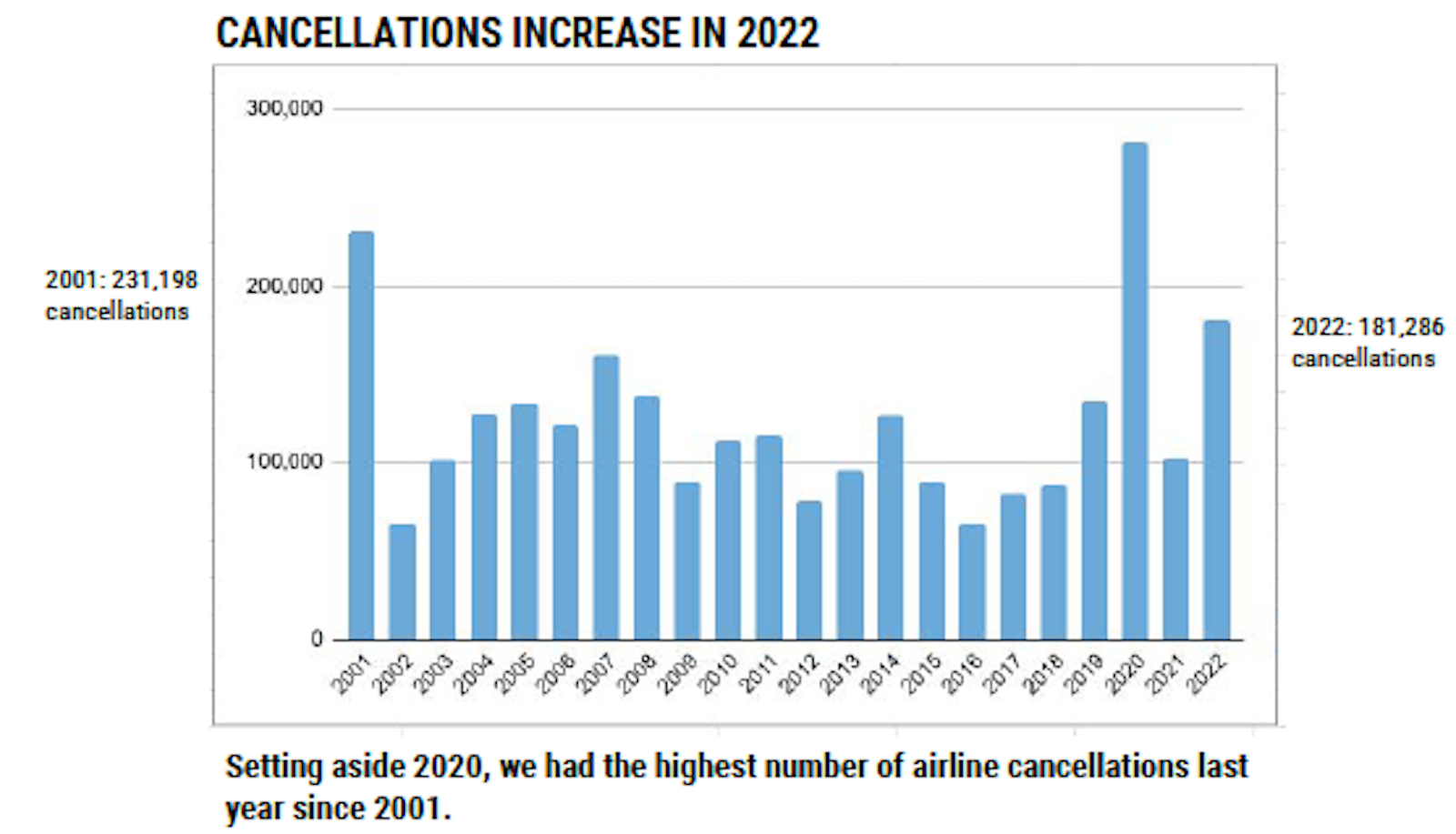
CHRISTMAS MELTDOWN CAPPED A YEAR OF INCREASED CANCELLATIONS
Back in Ohio, Sands’ experience checks almost all of the boxes of the airline industry’s very bad awful no good year. Or three bad years.
Poor customer service and poor communication? Check. Multiple canceled flights? Sure. Lost bags? Yup. Unwillingness to accept any responsibility? Definitely.
For all that Sands and her husband dealt with, she hasn’t yet followed through yet with a DOT complaint. When the Ohio couple first got back from their two weeks away in December, they were trying to catch up on the Christmas they missed with their family and friends. And they were mentally exhausted. And then the holidays were over and it was time to go back to work.
The Christmas weekend meltdown for millions of travelers – with more than 25,000 flights canceled from Dec. 22 through Dec. 29 – was just the latest nightmare that millions of travelers would like to forget. Those were the bulk of the 31,187 flights canceled in December.
The biggest problems in 2022 were refunds, and cancellations and delays.
For all of 2022, 190,038 flights were canceled in the United States, or 2.7% of all scheduled flights. That’s just the ones that were canceled within seven days of departure. The rest don’t count.
Read more
With that as a backdrop, here’s what DOT says:
Those with the highest percentage of cancellations in 2022, and above the industry average:
JetBlue: 3.7%
Allegiant: 3.5%
Southwest: 3.3%
Spirit: 3%
Frontier: 2.9%
American: 2.8%
Those with the lowest percentages of cancellations:
Hawaiian Airlines: 0.92%
Delta: 2%
Alaska: 2.2%
United: 2.7%
The numbers were much worse for December, when the top 10 airlines and their marketing partners canceled a total of 31,187 flights. About 17,000 of those were from Southwest – an eye-popping 15% of its flights Alaska canceled nearly 8 percent of flights, while Allegiant canceled 5 percent..
Over the last nearly two years, the airlines have pointed the finger at bad weather, COVID variants, space shuttle launches and air traffic controllers. Anything but themselves.
If we don’t even know how many cancellations there are, how can we possibly fix it?William McGee
Senior Fellow, Aviation and Travel at the American Economic Liberties Project
WHEN A CANCELLATION ISN’T REALLY A CANCELLATION
Keep in mind that that figure includes only flights canceled within seven days before the planned departure date. Flights that get scrubbed more than seven days ahead of time are considered “discontinued flights.” So while a flight that gets canned eight or 10 days before your trip might be a hassle to rebook – possibly facing higher prices or no available seats – it doesn’t count against the airline.
This little-known fact about “discontinued” flights had been kept largely under wraps until cancellations started becoming such an enormous problem last year.
William McGee is one veteran of the airline industry and consumer advocacy who was blindsided by a DOT disclosure that flights that are canceled aren’t really considered by DOT to be canceled if they’re canceled more than seven days before departure.
“I was blown away. I’ve been around the industry for 38 years. I always, always believed for all of these years that discontinued flights were rolled into cancellations,” said McGee, a senior fellow for aviation and Travel at the American Economic Liberties Project who was with Consumer Reports for 22 years. “The worst part of it is (discontinued flights) are not captured at all. That part is really disturbing.”
Read more
McGee, who was invited last week to speak at a Senate hearing on enhancing airline passenger protections, said it’s unacceptable to not use the dictionary definition of “cancellation” for flights that don’t happen. “If we don’t even know how many cancellations there are, how can we possibly fix it?”
The DOT does track cancellation rates for individual airlines, as well as delays for airlines and individual airports. If the flight you booked two months ago for a vacation that starts this weekend is removed from the airline’s schedule (canceled), you get a refund, of course. But that may not make you whole if you have to rebook your flight and prices have increased because it’s a last-minute reservation.
The DOT reports the cancellation rate was much worse for December, when the top 10 airlines and their marketing partners canceled a total of 31,187 flights. About 17,000 of those were from Southwest – an eye-popping 15% of its flights. Alaska canceled nearly 8 percent of flights, while Allegiant canceled 5 percent..
Over the last nearly two years, the airlines have pointed the finger at bad weather, COVID variants, space shuttle launches and air traffic controllers. Anything but themselves.
THE LONG LIST OF WEEKS AND WEEKENDS HIT BY TRAVEL DISRUPTIONS
Consider this incomplete list of travel periods marred by cancellations and delays during an 18-month period from June 2021 through December 2022:
- June 2021: Southwest Airlines said operations were disrupted because of technology issues. Hundreds of flights canceled and thousands delayed — about half of Southwest’s flights in one day.
- July-August 2021: Spirit Airlines infamously canceled nearly 3,000 flights during an 11-day stretch.
- July-August 2021: American Airlines canceled hundreds of flights. It blamed weather, but it wasn’t just weather.
- October 2021: Southwest canceled more than 2,000 flights over a four-day period, costing the airline $75 million.
- October-November 2021: American Airlines, the nation’s largest carrier, canceled more than 2,300 flights over a period of several days.
- Christmas 2021: Thousands of flights were canceled or delayed, mostly because employees called out sick. United said it had to cancel hundreds of flights because it didn’t have enough crew members to operate them.
Read more
- Spring break 2022: During the first weekend in April, a heavy spring break travel weekend, more than 3,400 airline flights were canceled.
- Memorial Day 2022: 2,800 flights canceled, with Delta Air Lines leading the way.
- Juneteenth and Father’s Day weekend 2022, which included the busiest air travel day of the year to that point: More than 3,300 flight cancellations from Friday to Monday.
- July 4 weekend 2022: More than 2,200 U.S. flights canceled, and 23,000 more delayed.
- Labor Day weekend 2022: Hundreds of flights were canceled and thousands were delayed.
- Christmas 2022: More than 12,000 flights were canceled Dec. 21 through 24, and more than 25,000 flights were canceled in the two weeks after, as the airlines caught up.
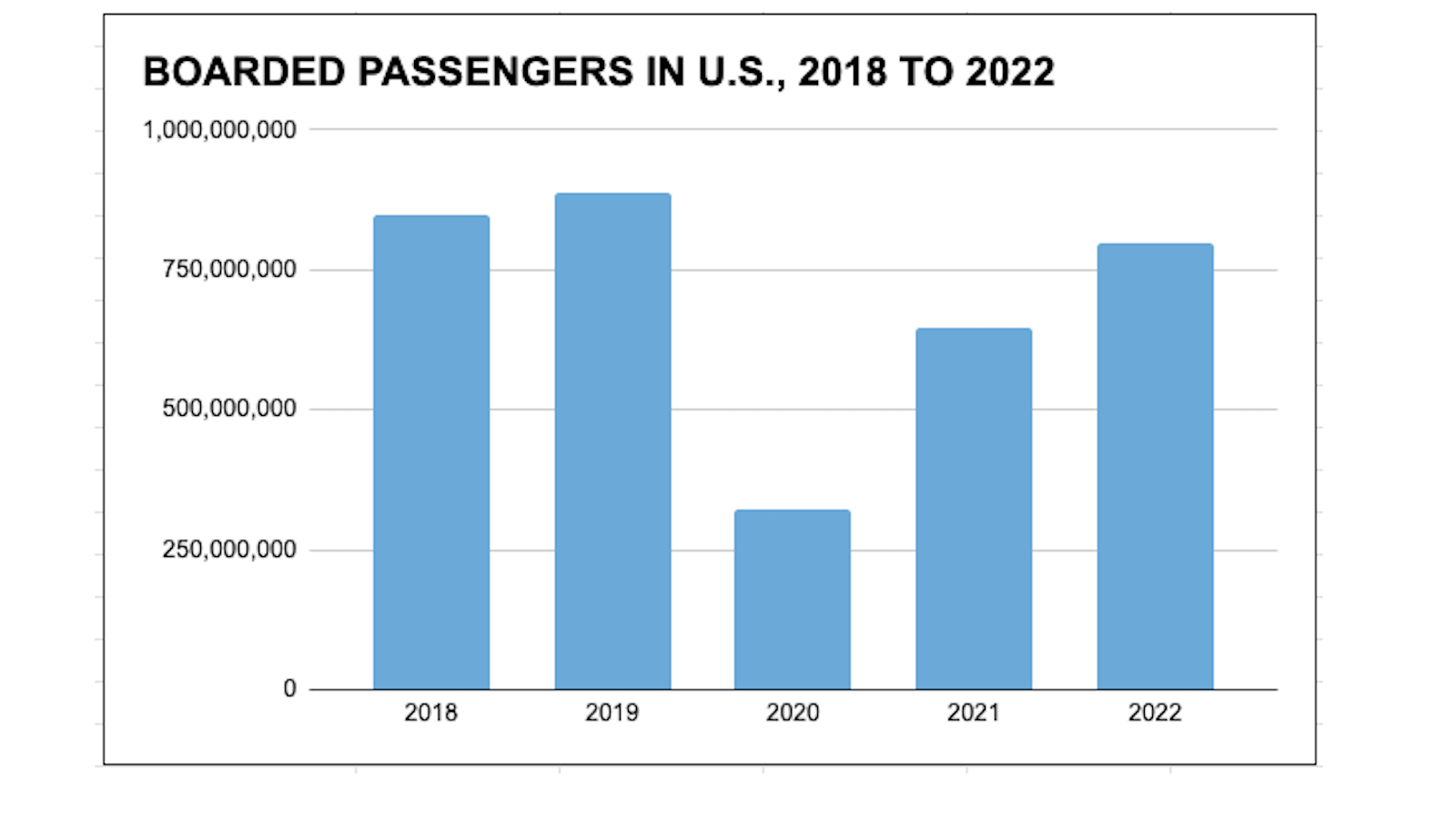
_
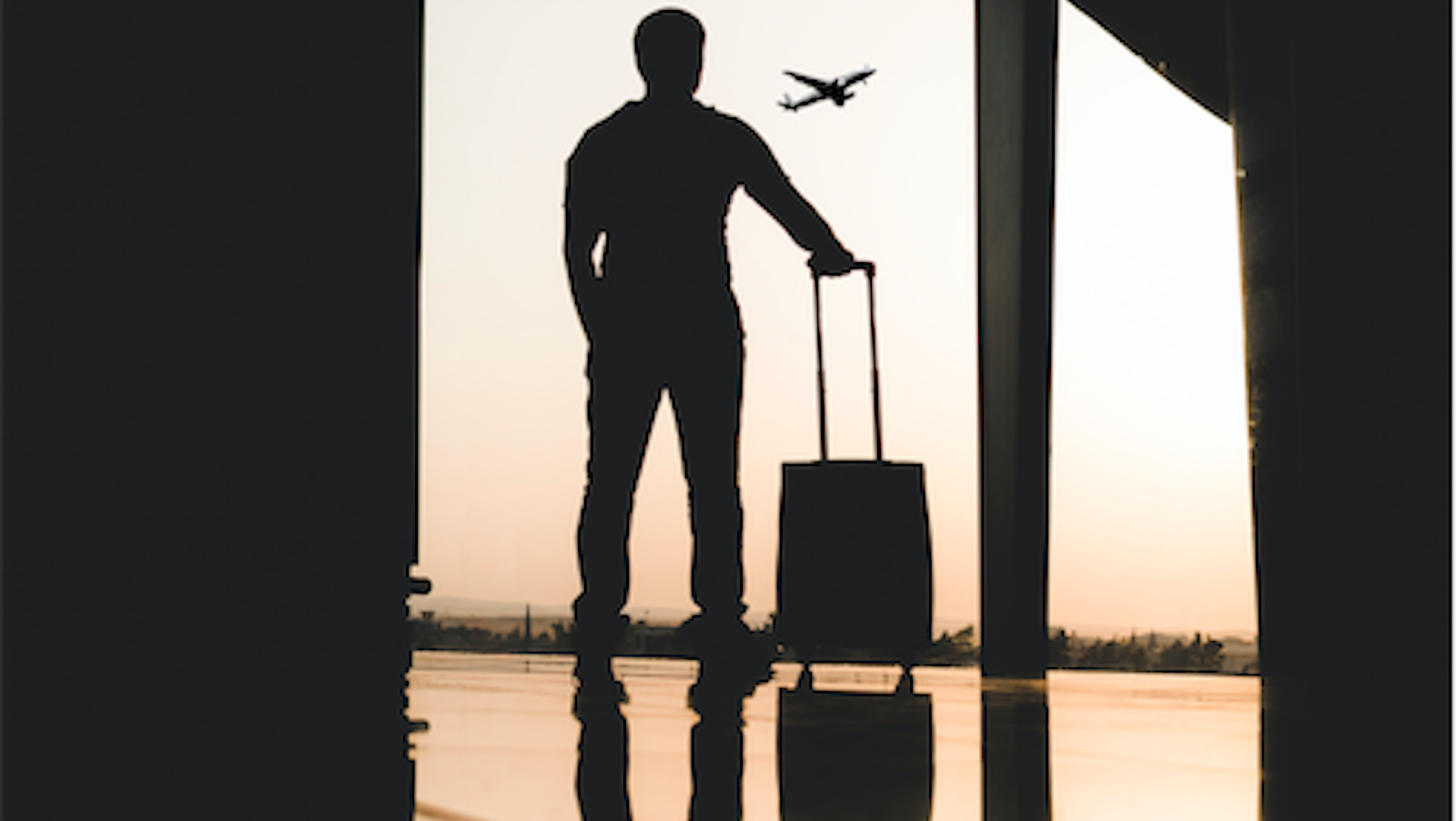
Flyers’ Bill of Rights
The DOT last year introduced a "public dashboard" to help consumers understand the commitments made by the largest airlines on how they handle various issues.
COMPLAINTS SKYROCKET IN 2022
There were 15,342 complaints filed in 2019. That skyrocketed to 60,732 for January through November 2022 – a fourfold increase even before the December avalanche is added in.
All of those cancellations and delays lead to unhappy travelers. And they get more upset when they have difficulty getting refunds for those canceled flights, get treated poorly, have their bags get lost – all while ticket prices have soared.
When travelers aren’t happy, they have recourse: Filing a complaint with the DOT, but only after they’ve tried to resolve their issue with the airline or whoever they think is responsible. Airlines are then required to acknowledge complaints within 30 days and respond in writing within 60 days.
There have certainly been a lot of complaints to respond to. In 2019, the last normal year before the pandemic, travelers filed 9,547 complaints against all U.S. airlines. In 2022, that more than tripled, to 33,647 for January through November 2022.
When you add in complaints against foreign airlines, third-party booking sites, travel agents and others, the total in 2019 was 15,342. That skyrocketed to 60,732 for January through November 2022 – a fourfold increase even before the December avalanche is added in.
Read more
Keep in mind this doesn’t reflect all of the travelers who actually had problems. It only reflects the ones who couldn’t get their issue resolved and then took the time to file a formal complaint.
Ann Evans of Texas did file a complaint. The information technology professional booked a round-trip ticket through American Airlines to Amsterdam in August 2021. She has a metal rod in her leg, so she booked a business class seat for the extra legroom. “I paid for business class because I find coach extremely tortuous,” she said.
Everything was fine until the last segment of the trip, from Philadelphia to Dallas. American put her in coach, which has less legroom. She was miserable.
This represents an “involuntary downgrade” of service. DOT rules say:
“A consumer is entitled to a refund if the consumer was involuntarily moved to a lower class of service. For example, if the consumer purchased a first-class ticket and was downgraded to economy class due to an aircraft swap, the consumer is owed the difference in fares.”
The coach seat cost less than the business class seat, and she didn’t like it. She calculated the difference in the prices for business class and coach in November 2021: $250. She complained to American. The airline originally refused to give her any refund for the downgrade in service. She followed up and they offered a $250 credit. She has no plans to travel anywhere anytime soon; she wants money back.
She filed a complaint with the DOT in September 2022, a process which automatically requires the airline to respond. American then offered to extend her credit through the end of 2023. American isn’t hearing her and while she notified her FAA complaint agent that she didn’t get resolution, she hasn’t heard back and the voicemail box for the agent is full.
“I wish the DOT would implement some kind of tracking system for complaints” that haven’t yet been resolved, Evans said. She hasn’t given up hope of getting her refund.
Complaints about refunds
Refunds is again the No. 1 complaint for January through November 2022, comprising 29% of complaints. The typical reason that travelers expect and are legally entitled to a refund is when the flight is canceled for any reason, whether it’s bad weather, staffing, equipment issues, security or something else.
2022 saw an explosion of refund complaints against travel agents, which mostly consists of third-party online booking companies that passengers use to find discount rates on travel-related purchases including flights and hotel rooms.
For January through November 2022, there were 5,433 complaints against travel agents, compared with 436 for all of 2019.
Those with more than 300 complaints against them from January through November:
CheapOair.com: 311
Expedia.com: 1,026
GoToGate: 332
JustFly.com: 363
Kiwi.com: 477
Priceline.com: 302
The majority of complaints against travel agents last year concerned refunds.
What is the DOT doing about refunds? Not enough.
The DOT did fine a half-dozen airlines in November for taking too long to issue refunds. But it included only one U.S. airline – Frontier Airlines. The refunds involved flights that had been canceled or significantly delayed or changed. The airlines were ordered to refund more than $600 million in refunds and pay more than $7.25 million in civil penalties.
“When a flight gets canceled, passengers seeking refunds should be paid back promptly,” Transportation Secretary Pete Buttigieg said in a statement. “Whenever that doesn’t happen, we will act to hold airlines accountable on behalf of American travelers and get passengers their money back.
“A flight cancellation is frustrating enough, and you shouldn’t also have to haggle or wait months to get your refund,” Buttigieg added.
Frontier was ordered to pay $222 million in refunds and fined $2.2 million, the most among the airlines. Air India and TAP Air Portugal’s fines topped $1 million. The other three, Aeromexico, El Al and Avianca, were ordered to pay less than $1 million.
The DOT crowed that the $8.1 million in civil penalties for 2022 was the largest amount ever issued in a single year by DOT, and promised these wouldn’t be the last fines.
The regulator has proposed strengthening consumer protections so travelers can get refunds more easily. The proposed new rules on Airline Ticket Refunds would:
- Define a significant change as a flight that is delayed three hours or more for a domestic flight or six hours or more for an international flight. A significant change would also include a change to the departure or arrival airport or that increases the number of connecting flights; or a switch to a different type of airplane that leads to “a significant downgrade in the air travel experience or amenities available onboard the flight.”
Currently, there is no definition about what qualifies as a significant delay. Establishing the three-hour threshold would be welcomed. - Require airlines to “proactively inform passengers that they have a right to receive a refund when a flight is canceled or significantly changed,” before pushing credits or vouchers.
- Require airlines to offer non-expiring vouchers or travel credits when people can’t travel because they have COVID or another communicable disease, and require that airlines that take taxpayer money in the future be required issue refunds instead of non-expiring travel credits or vouchers when passengers are advised not to travel because of a serious communicable disease.
The DOT held a public hearing on these proposed new rules on March 21.
ON-TIME ARRIVALS DECLINED
Flight problems was the No. 2 complaint for January through November 2022, comprising 26%. This category covers cancellations, delays, or any other schedule changes.
In addition to the increase in cancellations, the airlines’ on-time performance also suffered in 2022. A flight is considered the the DOT to be on time if it arrived within 15 minutes of the scheduled time, meaning it wasn’t delayed or canceled.
On-time arrivals by year:
2022: 76.7%
2021: 81.1%
2020: 84.5%
2019: 79.0%
The airlines with the worst on-time performances in 2022, when the delays and cancellations within seven days are tallied:
Allegiant Air: 63%
JetBlue: 65%
Frontier: 66%
The airlines with the on-time performances in 2022 higher than the top 10 average:
Delta: 82%
Alaska Airlines: 79%
United: 79%
American: 77%
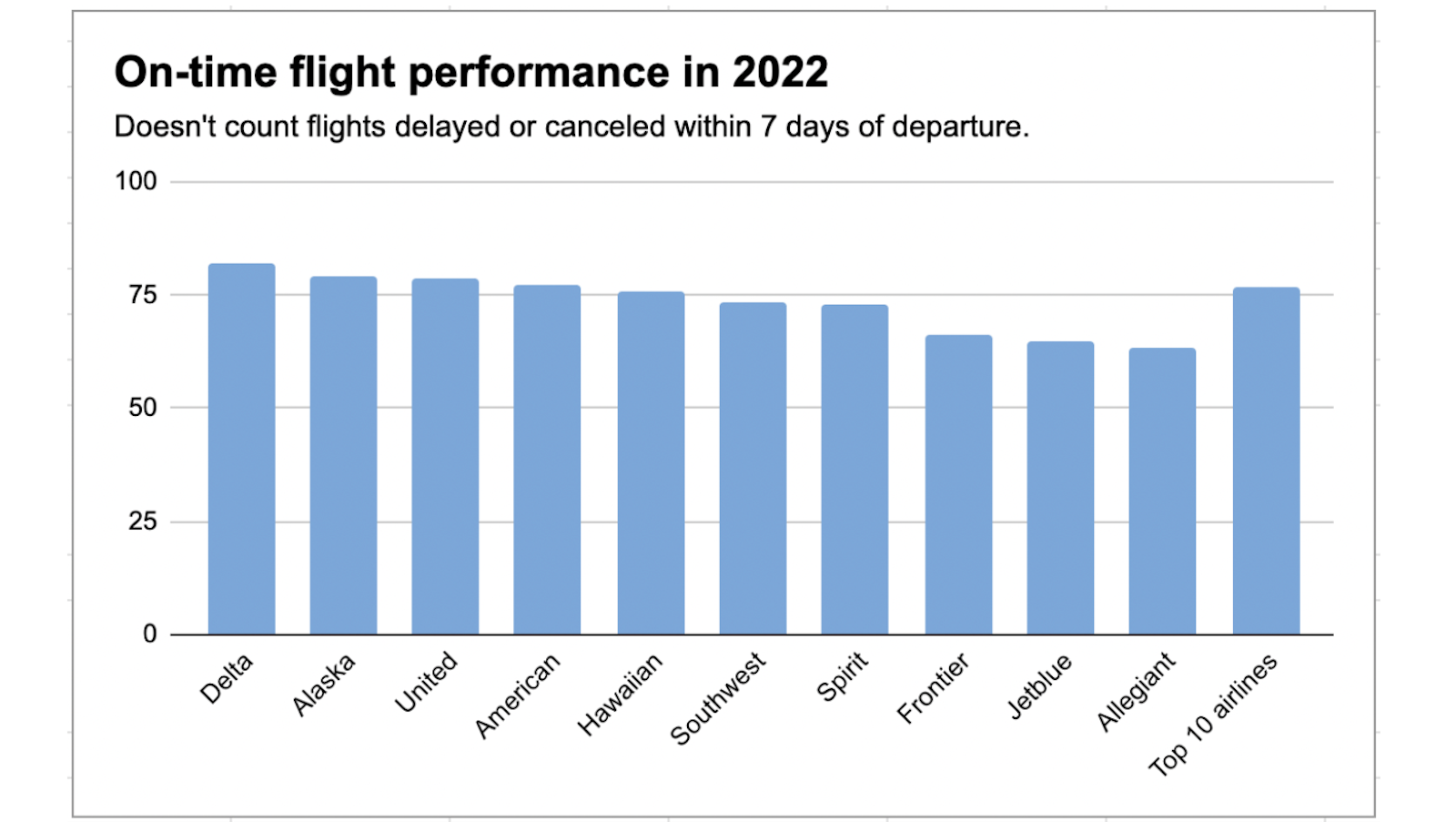
BAGGAGE LOST, DAMAGED OR PILFERED
Coming in third in complaints in 2022 (January through November) was baggage issues, at 16% of complaints.
Of the 470 million bags boarded in January through December 2022, nearly 3 million were mishandled. The total number of bags is slightly below 2019 – when 507 million bags were boarded but fewer bags were mishandled. The mishandled rate went up from 5.9 per 1,000 in 2019 to 6.4 per 1,000 in 2022.
Among the items mishandled last year: 11,389 wheelchairs and scooters that were placed in the cargo compartment. (This is a bigger problem because these often take weeks or months to get repaired because of repair restrictions.)
If travelers’ bags are lost, pilfered or delayed, they do have rights, including a refund for any checked baggage fees, and reimbursement for lost items up to $3,800.
For purposes of mishandling, DOT tallies bags only on nonstop flights, not connecting flights. And DOT counts wheelchairs and scooters put in the cargo compartment as bags. DOT looks at all U.S. airlines with at least 0.5% of total domestic passenger revenues.
BUMPING
When an airline sells too many seats for a flight and everyone shows up, someone has to go. Airlines generally ask for volunteers and offer another flight plus compensation of varying amounts. Of the 317,707 travelers bumped from flights with U.S. airlines, more than 90 percent volunteered. But that left 25,626 bumped or “denied boarding” involuntarily.
While not the largest issue travelers dealt with in 2022, the percentage of passengers bumped involuntarily nearly doubled from 2021.
For passengers who are bumped involuntarily, the airline must provide compensation if the person will be delayed one hour or more:
- For domestic flights with a one- to two-hour delay, the compensation is double your one-way fare, up to $775.
- If the delay is more than two hours, the compensation is quadruple your one-way fare, up to $1,550.
- The compensation levels are higher for international flights.
Nearly 1,200 travelers last year filed complaints about bumping – meaning they likely weren’t satisfied with the resolution – from January through November. That’s four times as many as in 2021 and three times as many as in 2019.
When flights are oversold, airlines prefer to take volunteers to be bumped, for public relations and financial reasons. When seats weren’t available last year, 292,181 passengers volunteered to get bumped. That’s up from 171,792 in 2021 but down from 506,569 in 2019.
SO WHAT DOES THIS ALL MEAN?
The data show airline travel is much more stressful today for many travelers, with uncertainty about whether their flight will be canceled or significantly delayed, whether they will get bumped, whether their baggage will be lost or damaged or, if their flight is canceled, whether they’ll get a timely refund.
DOT has taken some steps (but not enough) to improve travel for consumers. Last summer, for example, it unveiled an Airline Customer Service Dashboard that discloses the various policies for the 10 largest airlines and how customer-friendly or not those policies are.
The three policies outlined for now are:
- Commitment to Fee-Free Family Seating, which “guarantees adjacent seats for (a) child 13 or under and an accompanying adult at no additional cost for all fare types subject to limited conditions.”
- Commitments for Controllable Cancellations.
- Commitments for Controllable Delays.
Read more
A controllable flight cancellation or delay is essentially a delay or cancellation caused by the airline. Examples include: maintenance or crew problems; cabin cleaning; baggage loading; and fueling.
On cancellations within the airlines’ control, these airlines will rebook the passenger on a partner airline or another airline at no additional cost:
Alaska
American
Delta
Hawaiian
JetBlue
United
The airlines that haven’t committed to rebooking:
Allegiant
Frontier
Southwest
Spirit
All 10 companies will rebook on their own airline and provide money or a voucher for meals when a cancellation within the airlines’ control delays a passenger by three hours or more.
All except Frontier will pay for a hotel and ground transportation to and from the hotel.
The policies are the same for controllable delays, except that Hawaiian won’t rebook on a partner airline or other airline at no additional cost.
Only three of the airlines have made the commitment on fee-free family seating: Alaska, American and Frontier.
The hope behind the dashboard: That such an easy-to-understand, public-facing comparison will put pressure on the airlines to change their policies.
The good news is that attention is being paid to the problems. A number of new rules and laws have been proposed by DOT or discussed by members of Congress.
WHAT’S BEING DONE
Besides the likely change to require refunds for delays of three hours or more for domestic flights, the DOT has discussed cracking down on:
- Airlines that don’t provide refunds quickly.
- Fees that aren’t transparent.
- Airlines that charge parents or caregivers extra to sit next to their young child.
- Vouchers and credits that expire too soon.
Read more
DOT has proposed:
- Better transparency in pricing. The DOT wants to make sure consumers have access to more fee information upfront. Under the rule, airlines and “travel search websites” would have to disclose any fees to sit with your child, change or cancel your ticket or to check or carry on any bag.The disclosures would be required the first time the airfare cost is displayed.“The proposal seeks to provide customers the information they need to choose the best deal. Otherwise, surprise fees can add up quickly and overcome what may look at first to be a cheap fare,” DOT said in a statement.DOT held a day-long public hearing on this issue alone on March 30.
- Requiring refunds to customers who paid for services that weren’t provided, such as WiFi.
DOT has also:
- Strongly encouraged U.S. airlines “to do everything in their power to ensure that children who are age 13 or younger are seated next to an accompanying adult with no additional charge.” DOT said it receives complaints involving babies as young as 11 months old who are not able to be seated next to their adult travel companion.DOT this monthsubmitted a legislative proposal to Congress on this issue.The DOT Office of Consumer Protection plans to scrutinize airline policies and consumer complaints “If airlines’ seating policies and practices are barriers to a child sitting next to an adult family member or other accompanying adult family member, the Department will consider additional action consistent with its authorities,” DOT said.
Over in Congress, legislators have discussed several possible new bills, dealing with boosting consumer rights, fee transparency, fees for children to sit with their parent, issues with certain ancillary fees and seat size because of concern over whether passengers could evacuate quickly if necessary.
CONCLUSION AND RECOMMENDATIONS
We have several recommendations to help protect travelers: Transparency in fees, prompt refunds, reciprocity among the airlines, better scheduling, accountability and elimination of federal preemption for the airlines.
Read more
- Transparency
Airlines and third parties should disclose all fees up front, as part of the ticket price, and clearly spell out any ancillary fees before a traveler gets ready to click the button to book the flight. This would allow consumers to better compare prices. This practice shouldn’t have to wait on a new DOT rule.
- Refunds
Full refunds are required by law when an airline cancels or discontinues a scheduled flight for any reason. This refund must include baggage fees, seat fees, taxes, etc.. Airlines should not try to offer consumers a credit or voucher first, when they’re entitled to refunds. The volume of refund complaints indicates too many consumers aren’t getting timely refunds, even when they ask for them. Last year’s regulatory action by DOT against six airlines doesn’t scratch the surface to address the extent of the problem. Consumers are still owed upwards of $10 billion from flights canceled during the pandemic.
- Better scheduling
Airlines should do a better job scheduling flights, so they’re not just putting flights on the schedule without regard to whether they really expect to fly the route at that time.
Then they cancel flights without any real repercussions, particularly because they’re not counted as cancellations if they’re scrubbed more than a week before departure. (They’re called “discontinued” flights.)
Whatever they’re called, this can be a huge inconvenience and financial stress to travelers who may have booked flights months in advance, only to have them canceled eight or 10 days before the travel date, meaning there’s a good chance replacement tickets may be more expensive or unavailable.
- Accountability
DOT should do more to hold airlines accountable for chronically delayed, canceled or “discontinued” flights.
- Eliminating federal preemption involving the airlines.
The states should be able to enforce existing federal consumer protection laws, but they can’t. And 35 of the state attorneys general signed a letter to Congress on this issue last August.
HELP FOR PASSENGERS:
-
Passengers have rights for issues such as refunds, cancellations, delays, tarmac delays and lost baggage.
-
For refunds, travelers should know they’re entitled to a full refund if their flight is canceled for any reason – weather, equipment, staffing, etc.
-
And if they choose to accept a credit or voucher, it’s important to understand how they work at each of the 10 largest domestic airlines.
-
Tips before you book your next flight.
-
Here’s how to file a complaint with the DOT.
Topics
Authors
Teresa Murray
Consumer Watchdog, U.S. PIRG Education Fund
Teresa directs the Consumer Watchdog office, which looks out for consumers’ health, safety and financial security. Previously, she worked as a journalist covering consumer issues and personal finance for two decades for Ohio’s largest daily newspaper. She received dozens of state and national journalism awards, including Best Columnist in Ohio, a National Headliner Award for coverage of the 2008-09 financial crisis, and a journalism public service award for exposing improper billing practices by Verizon that affected 15 million customers nationwide. Teresa and her husband live in Greater Cleveland and have two sons. She enjoys biking, house projects and music, and serves on her church missions team and stewardship board.
Find Out More

Is Alexa always listening? How to protect your data from Amazon
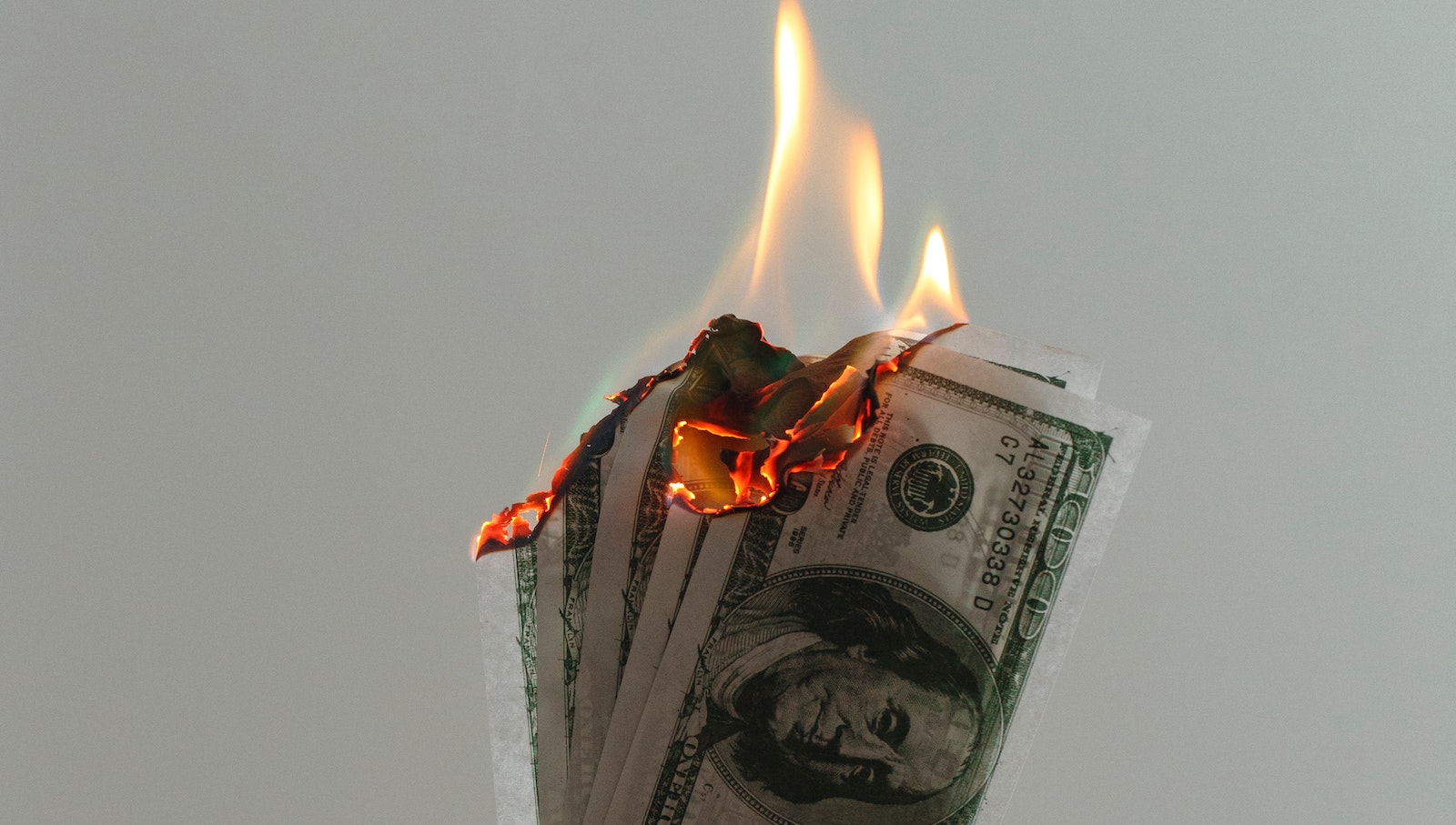
Junk fees should be banned, U.S. PIRG tells FTC

How to use iPhone privacy settings 2024

